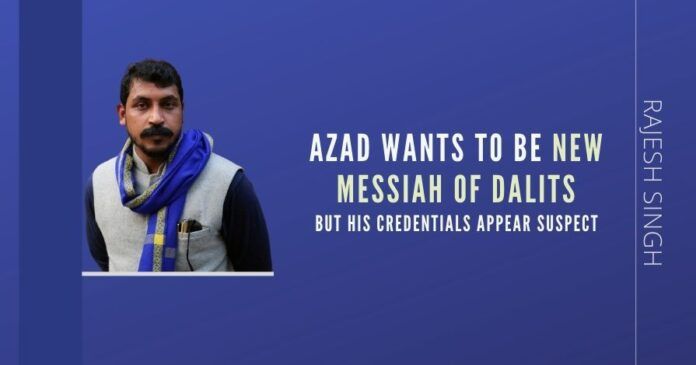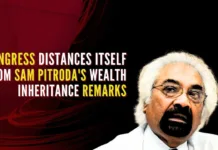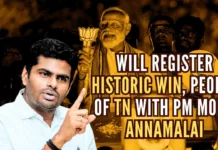
Azad can benefit from the decline in both Mayawati’s and the BSP’s influence. He believes that these ventures will not only keep him in the limelight but also help attract the Dalit votes.
Chandrashekhar Azad may believe that the Azad Samaj Party (ASP), the new outfit he has floated to primarily tap into the country’s Dalit votes, will catapult him to political relevance across the country, or at least in Uttar Pradesh to begin with. But he has a difficult task ahead.
First, he has to counter the influence of Mayawati and her Bahujan Samaj Party, which has over the decades established a strong presence in Uttar Pradesh. He had tried to outsmart her with his earlier organization, the Bhim Army, but failed. Azad then extended an olive branch to her, but the BSP supremo contemptuously rejected it. Both the failures were along expected lines. The Bhim Army was seen as a fringe organization by the Dalits, not having the capability or reach to do much for them, both politically and socially. The Bhim Army was no match for the well-oiled BSP machinery. And, Mayawati was in no mood to accommodate someone who sought to breach her vote-bank and could later emerge as a rival to her after riding piggyback on her popularity.
Azad even waded into the Citizenship Amendment Act controversy in Delhi, addressing a few meetings there. He believes that these ventures will not only keep him in the limelight but also help attract the Dalit votes.
The other reason why the Bhim Army did not progress much was the changing political preference of the Scheduled Caste voters in Uttar Pradesh. Since 2014, they have moved away even from the BSP and voted for the Bharatiya Janata Party. This was evident in the 2014 and the 2019 Lok Sabha elections as well as the 2017 State Assembly polls. The BSP did hold on to some parts of the vote-bank but that was not enough for it to gain a victory. With the Dalit voters dumping even the BSP, the Bhim Army did not stand a chance of striking a chord.
This led Azad to launch various protests, at times outside the State, to keep himself in circulation. He even waded into the Citizenship Amendment Act controversy in Delhi, addressing a few meetings there. He believes that these ventures will not only keep him in the limelight but also help attract the Dalit votes.
Azad and his Bhim Army shot into prominence in Uttar Pradesh by rising issues of caste discrimination and oppression. They crafted a militant image to proceed with their strategy, taking inspiration from violent protests involving agitators in Kerala in the 1990s and the Dalit Panthers in the 1970s. Azad’s antics led to his arrest by the Uttar Pradesh police in June 2017, and he became something of a local hero after getting bail. Soon after, the State government slapped the National Security Act on him and he was arrested yet again — this time he remained behind bars for several months. On his release in the latter half of 2018, he had established himself as somebody with enormous nuisance value, but nothing more.
Dr. BR Ambedkar’s experiments with politics through the various outfits he floated did not do too well. The Republican Party of India — his brainchild, which came into existence after his death — has fragmented beyond recognition.
Azad has always been on the lookout for incidents to cement his pro-Dalit profile. He mobilized people in the wake of the demolition of a Ravidas temple in Delhi. Saint Ravidas is a revered figure among the Scheduled Caste community. He sought to occupy the space left empty by political organizations which had been less vociferous on the issue.
It can be argued that Azad can benefit from the decline in both Mayawati’s and the BSP’s influence. While it is true that the BSP and its supremo are not in the best of political health today, they are no pushovers either — certainly not for the likes of Azad and his ASP. The new party chief’s aggressive tenor may have appealed to a section of the voters, but it’s likely to alienate more in the process. It must be remembered that even Mayawati had been belligerent in the early days of her politics but that fetched her only short-term gains. Eventually, she had to tone down her aggression and try to co-opt people from outside the Dalit community in her political space. Indeed, it was only after she did it, that she came to power on her own strength in 2007 in Uttar Pradesh.
It is clear that Azad is seeking to directly challenge Mayawati by invoking her mentor Kanshi Ram and his ideology of inclusiveness of the marginalized — the Dalits, Muslims, and the Other Backward Classes. However, after a while, even Kanshi Ram had failed to keep them all together. The OBC’s shifted to either regional parties or the BJP, while the Muslims kept switching their loyalty from one regional outfit to another. Even Mayawati, after her brief experiment with the so-called social engineering, abandoned the project and began to concentrate on the Scheduled Caste vote bank.
The problem for Azad is the same that the BSP faces — fragmentation of the Dalit votes. Today, only a sub-caste of the Dalits is aligned with the BSP; the others have gone elsewhere, largely to the BJP. It will be difficult for Azad to lure these to his fold, that too with the (untested) might of his new party and the old but generally ineffective Bhim Army — which will continue to remain in existence.
Dalit social movements across the country have been big hits, but political movements have had limited success. Dr. BR Ambedkar’s experiments with politics through the various outfits he floated did not do too well. The Republican Party of India — his brainchild, which came into existence after his death — has fragmented beyond recognition. It is unlikely that Chandrashekhar Azad and his ASP will work wonders in the electoral battle.
Note:
1. The views expressed here are those of the author and do not necessarily represent or reflect the views of PGurus.










